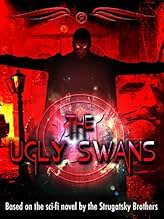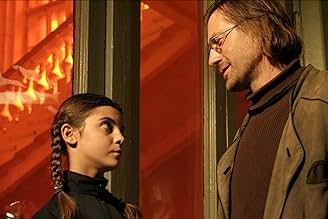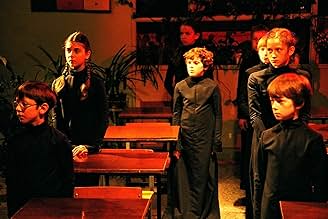IMDb RATING
6.9/10
1.7K
YOUR RATING
The writer is invited to the town of Tashlinsk by the mutants who emerged after an unnatural and constant rain causing the evacuation of the city, and by the children who are studying the un... Read allThe writer is invited to the town of Tashlinsk by the mutants who emerged after an unnatural and constant rain causing the evacuation of the city, and by the children who are studying the unearthly knowledge of mutants.The writer is invited to the town of Tashlinsk by the mutants who emerged after an unnatural and constant rain causing the evacuation of the city, and by the children who are studying the unearthly knowledge of mutants.
- Awards
- 4 wins & 7 nominations total
Gregory Hlady
- Viktor Banev
- (as also Grigoriy Gladiy)
Aleksey Kortnev
- Pavel Sumak
- (as also Alexei Kortnev)
Sergey Barkovskiy
- Gennadiy Komov
- (as also Sergei Barkovsky)
Dmitriy Ispolatov
- Bora Kunitsa
- (as Dima Ispolatov)
Aleksey Ingelevich
- Valentin Pilman
- (as also Aleksei Ingelevich)
Viktor Mikhaylov
- Mokrets Zinoviy
- (as Victor Mikhailov)
Featured reviews
Unfortenetly i didn't read the book(by Strugatsky brothers)but i seem to get the idea- the humanity is in a very critical point of time and as always there are 2 options... I must admit i'm not a big fan of this idea (it seems that every one think that only our generation lives in a very unique time and all the others are not so interesting)but the wonderful filming-the superb camera work just makes you to feel the darkness, wetness and the agony the people in the film are in.So in my point of view if you looking for grate camera work like in "Mother &Son", "Stalker" and so on you're in the right place, and also if you lived in USSR there some unforgettable moments that could have happen only there!
Long ago in Soviet Union lived two brothers -- Arkady and Boris Strugatsky. They had a dream -- to live in Communism -- and as they were writers, they devised the World of Noon, the future society of people appreciating creative work the most, socially responsible and enjoying living. It occurred, it wasn't a dream about Communism, that's why the writers soon became anti-Soviet, and the dream started living its separate life, changing, infecting new generations of engineers and scientists, strangely surviving under any system...
"Ugly Swans" are not about World of Noon, but those who are able to appreciate it. So... The future intrudes into our world. Perhaps not a very happy one, because agents of it -- Aquatters -- are targeted by unknown genetic disease. Aquatters came to a provincial Russian town, set the rules they like and started to educate children. For children are our future, and changing them you make the world different. They teach rather strange things: what is hyperspace, and how to change weather, and other things, perhaps pretty important in the world of Aquatters. But top of all, they teach children to _think_.
What's the problem, you would ask? A little one. In children's dreams there's no place for us. Our world is bankrupt, our values are corrupt, our moral is false. They are ruthless... but they only want to live in _their_ world. They go ahead, not looking on us and not caring. It's not surprising that our civilization considers them a menace. We also can be ruthless, and too often we are ruthless without necessity... Writer Viktor Banev who happens to visit the town faces uneasy moral choices. Taking sides. Remaining humane when bad things happen... not little for a single person? The movie is said to be based on the 1967 novel, but paradoxically, ideas spoken out in that moth-eaten year grew only more topical today. And the world too often can't propose growing youths nothing but dull job, race for money and dumb TV shows for entertainment. Who is more miserable, children grown by Aquatters, who can't, don't want to live in our world, or we who don't feel their longing for knowledge and agree with the role of well-trained monkeys? Humanism is also a new facet unveiled in the movie. Old... and new. Whatever the theories, there are living people beyond it... Writer Banev from the 1967 novel acts because he feels contempt for the old world; writer Banev in the movie acts because he feels pain of others... he cares about people, not about worlds, and that, I hope shows that the old world is yet alive.
The last but not least, the movie isn't specifically Russian, more a tale of our civilization. And in, e.g. the United States it would be the same topical, I guess.
"Ugly Swans" are not about World of Noon, but those who are able to appreciate it. So... The future intrudes into our world. Perhaps not a very happy one, because agents of it -- Aquatters -- are targeted by unknown genetic disease. Aquatters came to a provincial Russian town, set the rules they like and started to educate children. For children are our future, and changing them you make the world different. They teach rather strange things: what is hyperspace, and how to change weather, and other things, perhaps pretty important in the world of Aquatters. But top of all, they teach children to _think_.
What's the problem, you would ask? A little one. In children's dreams there's no place for us. Our world is bankrupt, our values are corrupt, our moral is false. They are ruthless... but they only want to live in _their_ world. They go ahead, not looking on us and not caring. It's not surprising that our civilization considers them a menace. We also can be ruthless, and too often we are ruthless without necessity... Writer Viktor Banev who happens to visit the town faces uneasy moral choices. Taking sides. Remaining humane when bad things happen... not little for a single person? The movie is said to be based on the 1967 novel, but paradoxically, ideas spoken out in that moth-eaten year grew only more topical today. And the world too often can't propose growing youths nothing but dull job, race for money and dumb TV shows for entertainment. Who is more miserable, children grown by Aquatters, who can't, don't want to live in our world, or we who don't feel their longing for knowledge and agree with the role of well-trained monkeys? Humanism is also a new facet unveiled in the movie. Old... and new. Whatever the theories, there are living people beyond it... Writer Banev from the 1967 novel acts because he feels contempt for the old world; writer Banev in the movie acts because he feels pain of others... he cares about people, not about worlds, and that, I hope shows that the old world is yet alive.
The last but not least, the movie isn't specifically Russian, more a tale of our civilization. And in, e.g. the United States it would be the same topical, I guess.
This one is a miss. It's based on a book by Strugatsky brothers, but fails miserably to bring to the screen the enigmatic quality the book possesses. It's rather a straight forward attempt to push a liberal agenda. And a clumsy one imho. The book is way more nuanced and really tries to make one think on a subject of humanity.
The movie feels cheap and it is in most parts poorly acted. Especially by children actors. It's often regarded as Tarkovsky's influenced film (Lopushanskiy, the director, being a Tarkovsky's protege) but it isn't. I don't see any Tarkovsky influences here. Nether in style, nor in story construction.
This beautiful, small budget film plays like a tribute to Tarkovsky's films(shakuhachi music and dripping water), but it is more conversational and quite direct in its message, which isn't simplistic, for all that directness. That message rings true these days as much as it did when the novel was written. Has the world become dangerously, insidiously pedestrian and banal? Have we squandered our potential utterly? The spirit of the film, the whole tone of it, is alienating - we cease to trust ourselves a little bit while watching it. It is a fairly short film too, it doesn't tax the viewer in that way, although it will challenge viewers. The Strugatsky brothers are my favorite Russian authors, and this film does, above all else, capture the spirit of their book, as well as can be expected. I sure would like to find it on DVD.
The Ugly Swans is the third film I have seen from director Konstantin Lopushansky, a protégé of Andrei Tarkovsky. The other two films, A Visitor to the Museum and Letters from a Dead Man, were both indebted to Tarkovsky's visual style. The Ugly Swans is less so. Furthermore, its story (based on a novel by the Strugatskiy brothers) is told in a more straight forward fashion, although not every point is spelled out for the viewer.
Like A Visitor to the Museum, The Ugly Swans follows a man on a journey. In this case, the protagonist is an established fiction writer who is part of a U.N. team. The team's destination is Tashlinsk, a town that has been cut off from the rest of the world. Rain pours continually over the town and an unexplained infrared light coats the landscape with a red tint (shades of A Visitor to the Museum). Strange psychic creatures known as "wetters" control the area and mostly reside in a boarding school for gifted children. What are "Wetters"? What do they want? Why does the weather never change? These are the questions that the U.N. team have come to answer. The writer has a personal stake: His daughter is at the school.
The Ugly Swans does not have the same hypnotic quality as Letters from a Dead Man or A Visitor to the Museum. Despite this the film features some great individual scenes: The crossing of a no-man's-land, a flooded restaurant open for business, and a powerful ending. Storywise, I was reminded of Children of the Damned in the way Lopushansky portrays the students at the school. The Russian film is more ambiguous than the British film and may be harder from some to enjoy. However, fans of cerebral science fiction films should be intrigued by The Ugly Swans, which is available on a Ruscico DVD.
Like A Visitor to the Museum, The Ugly Swans follows a man on a journey. In this case, the protagonist is an established fiction writer who is part of a U.N. team. The team's destination is Tashlinsk, a town that has been cut off from the rest of the world. Rain pours continually over the town and an unexplained infrared light coats the landscape with a red tint (shades of A Visitor to the Museum). Strange psychic creatures known as "wetters" control the area and mostly reside in a boarding school for gifted children. What are "Wetters"? What do they want? Why does the weather never change? These are the questions that the U.N. team have come to answer. The writer has a personal stake: His daughter is at the school.
The Ugly Swans does not have the same hypnotic quality as Letters from a Dead Man or A Visitor to the Museum. Despite this the film features some great individual scenes: The crossing of a no-man's-land, a flooded restaurant open for business, and a powerful ending. Storywise, I was reminded of Children of the Damned in the way Lopushansky portrays the students at the school. The Russian film is more ambiguous than the British film and may be harder from some to enjoy. However, fans of cerebral science fiction films should be intrigued by The Ugly Swans, which is available on a Ruscico DVD.
Did you know
- TriviaFinal film of Svetlana Nemirovskaya.
Details
- Release date
- Countries of origin
- Languages
- Also known as
- Гидкі лебеді
- Filming locations
- Production companies
- See more company credits at IMDbPro
- Runtime1 hour 45 minutes
- Aspect ratio
- 1.85 : 1
Contribute to this page
Suggest an edit or add missing content

























